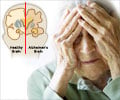
‘Study identified Alzheimer's-like amyloid plaques in the brains of people with clinically-verified obstructive sleep apnea.’
Tweet it Now
The two diseases are related, but the connection between them is unclear, said lead investigator Professor Stephen Robinson. "We know that if you have sleep apnea in mid-life, you're more likely to develop Alzheimer's when you're older, and if you have Alzheimer's you are more likely to have sleep apnea than other people your age," he said.
"It's an important advance in our understanding of the links between these conditions and opens up new directions for researchers striving to develop therapies for treating, and hopefully preventing, Alzheimer's disease."
The severity of sleep apnea is associated with a corresponding build-up of amyloid plaques.
The continuous positive airway pressure (CPAP) treatment approach for sleep apnea didn't make much difference to the number of plaques found in the brain.
Advertisement
The autopsy tissue from the hippocampus of 34 people and 24 people with OSA's brainstems, were investigated to identify the extent of Alzheimer's-like indicators.
Advertisement
The study found plaques and tangles in the brains of people with sleep apnea, the plaques showed a greater association with severe sleep apnea.
"In cases of mild sleep apnea, we could only find plaques and tangles in the cortical area near the hippocampus, precisely where they are first found in Alzheimer's disease," said Robinson, a researcher in RMIT's School of Health and Biomedical Sciences and Austin Health's Institute for Breathing and Sleep (IBAS).
"While some people may have had mild cognitive impairment or undiagnosed dementia, none had symptoms that were strong enough for an official diagnosis, even though some had a density of plaques and tangles that were sufficiently high to qualify as Alzheimer's disease," Robinson said.
Source-Medindia















